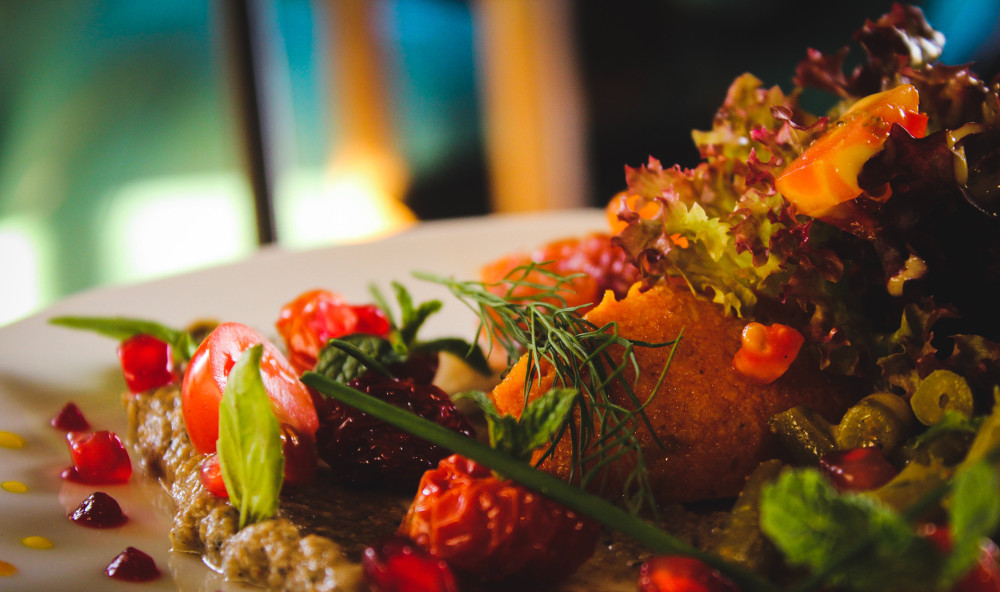
Mezze Recipes
Mouthwatering vegan mezze dishes from Nabil Nasser, head chef at Aya Lebanese restaurant in South Wimbledon
Houmus
Adding cubes of ice to the mix preserves the flavour from the heat of the food blender, and gives the proper light, silky texture. Be sparing with the garlic, too much overpowers it. You can use tinned chick peas, but cooking your own tastes nuttier and has a better texture.
Serves 4-6
250g dried chickpeas (or 2 cans ready cooked)
Salt
1 tsp cumin powder
1/2 clove of garlic, crushed to a puree
1-2 tsp lemon juice
Ice cubes
3 tbsp sesame tahini
Oil and sumac powder to serve (optional)
The night before, rinse your dried chickpeas and soak them overnight in plenty of cold water. Drain and boil them in fresh, unsalted water until they are very soft – this can take several hours. Drain and chill. If you are using canned chickpeas, leave out the previous stages, and just drain and rinse. Put the chickpeas in a food blender with a little salt and blend well. Gradually add the cumin, the lemon juice and the garlic. Add an ice cube to the mix to keep it cool, and blend until it is very very soft. Lastly, add the tahini to taste. Serve with a drizzle of olive oil and a sprinkle of sumac.
Baba Ghanoush
The best way to toast your aubergines is on a hot charcoal grill, but at home the best option is over a gas on the hob. Don’t do it in the oven, you will not get the same smoky flavour and the baba ghanoush will go off in the fridge.
Serves 4
2 ripe fresh aubergines, rinsed
Salt
I-2 tsp lemon juice
3 tbsp sesame tahini
Olive oil and pitta bread, to serve
Holding the aubergine over the flame using a skewer or tongs, char the skin until it is black and crisp. Don’t rush this process, as the aubergine must cook through to the middle – but don’t overcook it. Cool the aubergine, peel off the black skin, put it through the blender to chop it into tiny pieces. Catch any juices it releases, and add back into the mix to add flavour. Start adding salt, lemon juice, and sesame tahini, until you like the taste. Serve with a drizzle of olive oil over the top, and hot toasted pitta bread.
Tabouleh
Aim for a predominant flavour of herbs and sumac, with the lemon juice and olive oil there to mix it together. You can buy Sumac in many local grocers’ shops. If you are gluten intolerant, omit the wheat.
Serves 4
50g dried cracked Bulgur wheat
100g bunch of parsley, washed, tough stalks removed, and chopped
25g bunch of mint, washed, tough stalks removed, finely chopped
One large, sweet Spanish onion, peeled and finely chopped
Two large ripe tomatoes, deseeded and finely chopped
Extra-virgin olive oil
Juice of a large, fresh lemon
Salt
1-3 tsp Sumac (to taste)
Put the Bulgur wheat in a heatproof bowl, cover with boiling water and soak for 20-30 mins, until the water is absorbed and the grains are tender but a little chewy. Drain, and while it is cooling get on with your chopping.
Chop the herbs, onion and tomato, and combine in a serving bowl. Add the cool Bulgur wheat. Add 3 tbsp extra-virgin olive oil, then stir in the lemon juice, salt, and Sumac. Season the tabouleh to your preference – keep tasting repeatedly and adjusting the proportions. Serve immediately.





